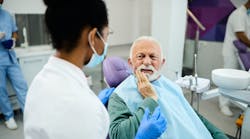Dental professionals are used to hearing any number of tropes, misperceptions, or exaggerations about the profession: that all dentists push unnecessary treatment to make money, that going to the dentist is inherently painful, that hygienists are just teeth cleaners, and others.
But what about couching the entire profession as “absurd”?
That’s the crux of a recent essay in Esquire that’s caught the attention of the dental community. In “Let’s just accept that dentistry is absurd,” the author, Jack Holmes, says that “going to the dentist is always a disgrace of some variety” and that his experience in his dentist's chair is akin to a “ritual flogging”:
“However much plaque you have is too much, even if you flossed every day—OK, most days—and even if the cleaning didn’t take that long … At the end, no matter what, you will be told in hushed tones that there was a lot of plaque.”
The author also expressed derision toward the respective roles played by dentists and hygienists in diagnosing caries:
“The hygienist cannot tell you there’s a cavity. She may have seen the cavity, but telling you would be a breach of protocol. Depending on her bedside manner, she might make a sound or tell you the doctor will take a look at that, or she might give no sign at all, nothing except wheeling around in her swivel stool and tapping away on the keyboard, making a note you know is not good. Nothing in the notes is ever good.”
Holmes went on to posit on the “inkling…that that every piece of dental advice is a possible scam. The new magic devices do not assuage the concern. On [my] last visit, the dentist discovered something on the 3D scan and never really examined my teeth in the traditional way.”
The article generated varied and impassioned feedback in the article’s comments section from dental pros and patients alike:
“As a dentist, I give out many A’s and A+’s! And that is what brings fulfillment and passion to my endeavor!”
“Maybe your neglected gums (teeth) are the problem here?”
“The cavity your dentist detected on x-ray probably wasn't visible or detectible on exam. This is why we take x-rays.”
David Rice, chief editor of DentistryIQ, said he while can sympathize with the author’s experiences, “it's clear by the comments posted that his experience is just that—his experience.”
“The patient/dental professional relationship is a challenging one. On one hand, we as dental pros must always put our patients first. We must always seek to engage, educate, and empower,” Rice added. “On the other hand, relationships beg a two-way street. Patients benefit most when they seek to understand, ask questions, and own their health.”
"The more patients understand what is happening in the appointment—why imaging is so important, for example—the more they are able to take responsibility for their own care," he said.






